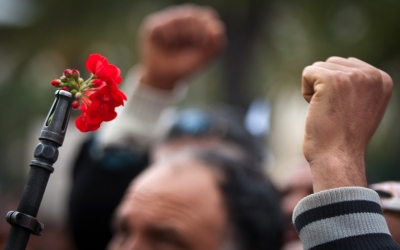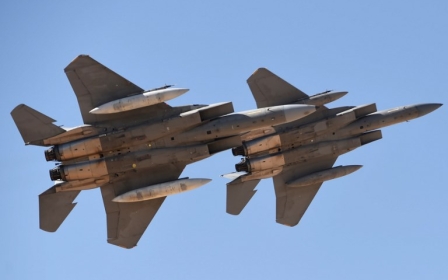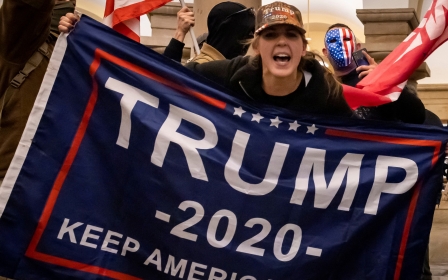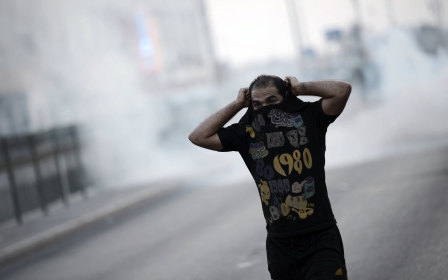Arab activists express caution over Biden's democracy summit

US President Joe Biden on Thursday kicked off a virtual conference on democracy with more than 100 countries, aimed at addressing the most pressing issues facing democratic movements around the world.
According to the State Department, the two-day summit will focus on defending against authoritarianism, fighting corruption, and promoting human rights.
It comes amid the Biden administration's goal of creating a bulwark against Russia and China, and also as the US itself was listed for the first time last month as a "backsliding" democracy by the Stockholm-based International Institute for Democracy and Electoral Assistance.
A network of Arab pro-democracy activists have expressed support for the summit but also issued caution, noting that Washington's continued support for authoritarian regimes in the Middle East is at complete odds with its goals.
After discussing a series of problems facing democracy in the region at a separate summit last week, titled Democracy First in the Arab World, the advocates said the Biden administration needs to support democracy by engaging with civil society and opposition groups rather than authoritarian leaders.
"We value President Joe Biden's effort to defend democracy in the world, and we wish the summit every success," Moncef Marzouki, the former interim president of Tunisia, said during a press conference on Tuesday.
"All that we call upon western countries in general and the United States, in particular, is to stop supporting authoritarian regimes or prevent our peoples from exercising their minimum rights to democracy," said Marzouki, who attended last week's Arab summit.
"With its support for countries like Egypt, the United Arab Emirates, or Saudi Arabia, it promotes the spread of the model of governance that blends liberalism and dictatorship."
Support of non-democratic states
The Arab Spring of 2011 had brought a wave of democratic revolutions across the Middle East, toppling a number of longtime leaders, including Zine El Abidine Ben Ali in Tunisia, Hosni Mubarak in Egypt, Muammar Gaddafi in Libya, and Yemen's Ali Abdullah Saleh.
Ten years later, however, little is left of these movements. Egyptian President Abdel Fattah el-Sisi staged a military coup in 2013 and removed the government of Mohamed Morsi, the first democratically elected president in the country's history.
In July, Tunisian President Kais Saied froze the country's parliament and seized wide-ranging powers. And in October, Sudanese General Abdel Fattah al-Burhan declared a state of emergency and ousted the government in a coup that upended a two-year transition to civilian rule and sparked international condemnation.
The absence of democracy in the region was reflected at the US summit, with only two countries from the Middle East being invited: Israel and Iraq.
Tawakkol Karman, a Yemeni activist, journalist and Nobel Peace Prize laureate, said that the lack of invitations to countries in the Middle East shows that the US understands these countries are not democratic states.
"The fact that only one Arab state was invited affirms the fact that the US obviously considers the remaining Arab regimes ranging from autocracy to dictatorship," she said during the press conference.
However, the US continues to support a number of non-democratic states in the region, including Saudi Arabia and the UAE, providing them with hundreds of millions of dollars worth of weapons deals.
Since being elected to office earlier this year, Biden has continued with a $23bn weapons sale to the UAE, approved a $200m sale to Egypt, and most recently approved a $650m sale of air-to-air missiles to Saudi Arabia.
Matthew Hoh, a senior fellow at the Center for International Policy, previously noted that while the US has placed sanctions on 30 percent of the world's autocrats, it provides and sells weapons to the other 70 percent.
'Work with civil society'
Abdullah Alaoudh, the Gulf director at Democracy for the Arab World Now (DAWN), said the White House should strengthen relations with civil society groups rather than supporting tyrannical governments.
"For a very long time, the world has tolerated dictators in order to achieve what some see as stability," said Alaoudh, who also serves as the general secretary of the National Assembly Party (NAAS), a Saudi political party rooted in democratic principles seeking to establish basic rights for Saudi society.
"However, authoritarian rogue figures such as [Saudi Crown Prince Mohammed bin Salman], Sisi and other dictators in the Arab world have proven to be great sources of instability at home and abroad.
"It is the interest of both Saudi Arabia and the international community to support popular efforts and work with civil society groups and activists to achieve a stable democratic system that saves the country from imminent implosion from within because the consequences will be devastating for all."
Meanwhile, Karman, the Nobel peace laureate, said Arab citizens "have every right to live free, just like the Americans, the Europeans and many peoples of the world who live as free citizens under democratic systems".
Middle East Eye delivers independent and unrivalled coverage and analysis of the Middle East, North Africa and beyond. To learn more about republishing this content and the associated fees, please fill out this form. More about MEE can be found here.






